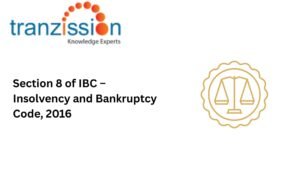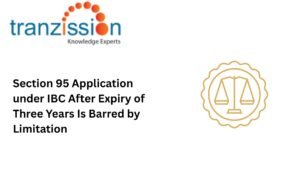
What you need to know about the MCA in Insolvency Law

Table of Contents
The Ministry of Corporate Affairs (MCA in Insolvency Law) plays a key role in India’s insolvency and bankruptcy framework, primarily through its oversight of the Insolvency and Bankruptcy Board of India (IBBI) and the Insolvency and Bankruptcy Code, 2016 (IBC). The MCA is responsible for formulating and implementing policies related to insolvency resolution, including the process for filing forms in the MCA-21 registry for insolvency professionals (IPs), and managing the company status in the MCA-21 database.
MCA’s Call for Stakeholder Inputs
The MCA in Insolvency Law has sought stakeholders’ input to revamp various rules or regulations under the IBC, including:
- An examination of rules on the insolvency process for personal guarantors to corporate debtors.
- Review of the special framework under Section 227 of the IBC for financial service providers (FSPs), excluding banks, and its interim nature pending comprehensive legislation.
- The need for assessment of the pre-packaged insolvency resolution process, especially for MSMEs, and potential areas for enhancement.
- The consideration of tweaks in rules related to applications to adjudicating authorities, annual statements of accounts, and annual reports as stipulated by the IBBI.
Historical Context and Previous Initiatives
Insolvency Law Committee (ILC):
The MCA in Insolvency Law established the ILC to monitor and improve the implementation of the IBC in 2016. The primary functions include identifying issues, considering stakeholder concerns, and recommending changes to the IBC to ensure its effective operation. The ILC recommendations are considered by the MCA and, if necessary, are proposed as amendments to the IBC through the legislative process.
Special Framework for FSPs:
The introduction of the Insolvency and Bankruptcy (Insolvency and Liquidation Proceedings of Financial Service Providers and Application to Adjudicating Authority) Rules, 2019, provides an interim mechanism for certain FSPs other than banks. These rules, applicable to FSPs or categories of FSPs as notified by the Central Government, offer a generic framework for their insolvency and liquidation proceedings. However, this framework does not apply to banks and is intended as a temporary measure pending comprehensive legislation.
Implications of the Proposed Revamp
For Insolvency Professionals:
The legal amendments are essentially improvements in procedural clarity and efficiency, thereby, professionals to stay abreast of changes and adapt practices accordingly. Staying updated allows them to provide accurate guidance, manage cases efficiently, and ensure compliance with the latest rules and practices.
For Corporate Debtors and Creditors:
There is still potential for more efficient resolution processes benefiting both debtors and creditors. The outcome of insolvency cases may be revival, rehabilitation, restructuring, or liquidation. Improved rules may lead to greater predictability in outcomes, which in the current framework is nearly impossible to guess.
Conclusion
The MCA in Insolvency Law is the central authority responsible for formulating and implementing policies on insolvency and bankruptcy in India. This includes the enactment and amendment of the IC, as well as the creation and regulation of the IBBI. It also provides guidance on the application of the IBC to various sectors, including FSPs. Stakeholders need to participate in shaping effective insolvency laws and the anticipation of a more robust and responsive IBC framework that aligns with global best practices and addresses domestic needs.
Read more :
Assessment of Social Impact in Insolvency Cases
The Role of Parliament in Refining IBC Framework





